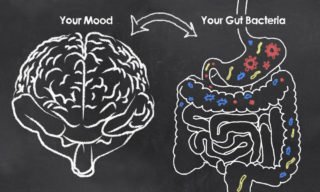Increasingly scientists are linking poor digestion and gut health to a range of health issues. Now researchers at Penn State University in the USA have confirmed oxytocin, the love hormone, plays an important role in forming links in the gut. The study was published today in The Journal of Physiology.
Digestion, the love hormone and link to stress
Under normal circumstances our digestive system should be able to go about its daily task of mixing, contracting and absorbing, to help break down our food. The task includes extracting the nutrients and vitamins that we require for good health. However, when stress hormones are flooding into our body, our digestive system is disrupted. This causes our digestive muscles to contract more or less frequently. Our gastric secretions and stomach acid levels will increase or decrease and our healthy gut bacteria will change composition.
Study highlights importance of brain and gut connection
We know that poor gut health is of growing importance because it has been directly linked to many lifestyle-related diseases, and even depression. Hence, research such as this new study conducted at Penn State University, College of Medicine is critical to confirming the importance of links in our physiological system.
The second brain
A hundred million neuro-receptors line the gut. This is about the same number that are found in the brain. Therefore, nearly every chemical that controls the brain can be found in the gut. Which is why it is often referred to as the second brain.
Stress and our digestion
Stress triggers and exacerbates the symptoms of functional gastrointestinal disorders, such as delayed gastric emptying (how quickly the stomach empties) and impaired gastric motility. This delay in gastric emptying causes bloating, discomfort, and nausea and accelerates colon transit, which causes diarrhea. Understanding the mechanisms in which neural circuits, impaired by stress, are restored may help identify potential targets for more effective therapeutic interventions.
Many benefits of the love hormone
Oxytocin, an anti-stress, or love hormone, has many benefits. It’s released from the hypothalamus in the brain which acts to counteract the effects of stress. Oxytocin is a hormone that acts as a neurotransmitter. It also plays an important role in reproduction. In females, the hormone triggers labor and the release of breast milk. In males, oxytocin helps move sperm.
The happy hormone
Oxytocin, dopamine, and serotonin are often referred to as our “happy hormones.” You know the feeling when you’re attracted to another person, your brain releases dopamine. Your serotonin levels increase, and oxytocin is produced. This causes you to feel a surge of positive emotion.
New ways to study how the love hormone behaves in the body
For a long time, the actions of the love hormone were believed to occur due to its release into the blood with only minor effects on the nerves within the brain that regulate gastrointestinal functions. Penn State University used new ways to manipulate the neurons and nerves (neuro-circuits) that oxytocin released from the hypothalamus acts upon. It also measured the effects on the response of gastric emptying to stress. They reported that, contrary to previous assumptions, these oxytocin circuits play a major role in the response of the stomach to stress. Indeed, activation of these oxytocin circuits reversed the delay in gastric emptying that occurs normally in response to stress. It does so by increasing muscle contractions (motility) of the stomach, while inhibition of these neuro-circuits prevented adaptation to stress.
Cutting edge tools
The study made use of cutting-edge tools to allow selective manipulation of circuits that receive hypothalamic oxytocin inputs together with simultaneous measurements of gastric emptying and motility in response to stress. Acute stress, appropriate adaptation to stress, and inappropriate adaptation to stress. The authors infected neurons (in rats) controlling the oxytocin nerves and neuro-circuits with novel viruses that allowed them to be activated or inhibited and measured muscle activity in the stomach, as well as gastric emptying (the time for food to leave the stomach).
Bottom line
The researchers confirmed that oxytocin neural circuits play a major role in the gastric response to stress loads. Indeed, their activation reversed the delayed gastric emptying observed following acute or chronic responses to stress. Thus increasing both gastric tone and motility. Conversely, inhibition of these neuro-circuits prevented adaptation to stress. Thus delaying gastric emptying and decreasing gastric tone. This all indicates that oxytocin directly influences the neural pathways involved in the stress response and plays a major role in the gastric response to stressors.
 Commenting on the study, R Alberto Travagli PhD and co-author of the study said: “Women are more vulnerable to stress and stress-related pathologies, such as anxiety and depression, and report a higher prevalence of gastrointestinal disorders. Our previous studies showed that vagal neural circuits are organized differently in males versus females. We are now finalizing a series of studies that investigate the role and the mechanisms through which oxytocin modulates gastric functions in stressed females. This will help develop targeted therapies to provide relief for women with gastrointestinal disorders. In order to identify targets for more effective treatments of disordered gastric responses to stress, it’s important to first understand how stress normally affects the functions of the stomach. This study provided new information about the role that the love hormone plays in controlling these nerves and circuits during stress and may identify new targets for drug development.”
Commenting on the study, R Alberto Travagli PhD and co-author of the study said: “Women are more vulnerable to stress and stress-related pathologies, such as anxiety and depression, and report a higher prevalence of gastrointestinal disorders. Our previous studies showed that vagal neural circuits are organized differently in males versus females. We are now finalizing a series of studies that investigate the role and the mechanisms through which oxytocin modulates gastric functions in stressed females. This will help develop targeted therapies to provide relief for women with gastrointestinal disorders. In order to identify targets for more effective treatments of disordered gastric responses to stress, it’s important to first understand how stress normally affects the functions of the stomach. This study provided new information about the role that the love hormone plays in controlling these nerves and circuits during stress and may identify new targets for drug development.”
References
The research study was sponsored by a grant from the National Institute of Health, USA.
Details of the study: Hypothalamic-vagal oxytocinergic neurocircuitry modulates gastric emptying and motility following stress. By Yanyan Jiang and R. Alberto Travagli Department of Neural and Behavioral Sciences, Penn State – College of Medicine, Hershey, PA. The full paper title is available here: https://physoc.onlinelibrary.wiley.com/doi/abs/10.1113/JP280023
The Journal of Physiology publishes advances in physiology which increase our understanding of how our bodies function in health and disease. http://jp.physoc.org
The Physiological Society brings together over 4,000 scientists from over 60 countries. The Society promotes physiology with the public and parliament alike. It supports physiologists by organizing world-class conferences and offering grants for research and also publishes the latest developments in the field in its three leading scientific journals, The Journal of Physiology, Experimental Physiology and Physiological Reports.






![women [longevity live]](https://longevitylive.com/wp-content/uploads/2020/01/photo-of-women-walking-down-the-street-1116984-100x100.jpg)









